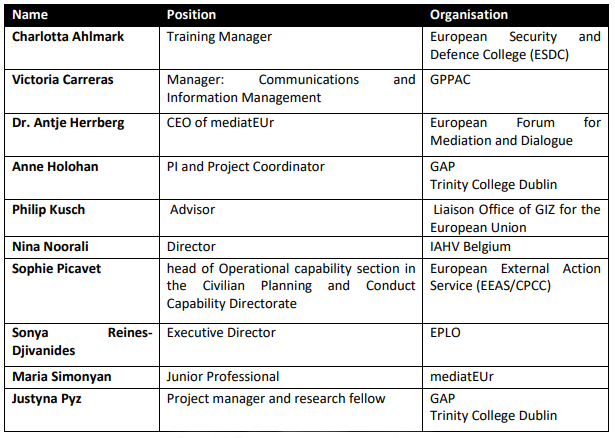The open sessions at the event supported several of the findings of the PeaceTraining.eu consortium under Work Package 3, focusing on current challenges in CPPB training. As such, the debates also support our findings under this Work Package. For example, speakers stressed the need for prevention, recurring gaps in the implementation of local ownership in CPPB activities, as well as funding constraints. Speakers also stressed the need for new (novel) methods, including e-learning approaches that support adult learning processes (see also the Deliverable 4.1. report on Novelty). The second sessions focused on what ‘peace training’ can learn from on the ground ‘peace education’, in divided societies. This analytical approach has also been adopted in the consortium’s work under Work Package 3, and especially in our work on the introduction of arts-based approaches in CPPB training (see 3.4. and 4.1. reports).
In the closed session, PeaceTraining.eu representatives first introduced the topic by contextualizing how CPPB training fits into wider educational standardization processes in Europe with reference to the Tuning process. Non-formal training including CPPB training tends to fall under European recommendations for vocational training. In terms of quality criteria, 4 categories of types of indicators exist: quality of the organization, of the learning process, of the staff, and of the results.
During the session, it became clear that the concept of ‘standardization’ caused considerable apprehensiveness among training providers. Indeed, the term ‘quality criteria’ was soon preferred. The basic tension that exists is that between a recognized need for quality criteria giving the costs of D2.5 Workshop summary report 1 © 2017 PeaceTraining.eu | Horizon 2020 – BES-13-2015 | 700583 11 training for donors such as state governments and participants alike, and a fear of domination and exclusion in the setting of standards in the sector. Power dynamics are important in this. For a small training organization it can be difficult to be included at the table when standards are being set as compared to large-scale and well-funded training organizations. There are severe financial and other practical constraints related to acquiring a seat at the sectoral table, all the more important as the sector of ‘CPBB’ training is often loosely defined and has no strict boundaries (see also the difficulties in defining the ‘humanitarian sector’). CPPB training can, for example, also include driving lessons (e.g. ENTRi Core Course), which is a technical aspect needed in CPPB, but fits into other standardization frameworks.
Furthermore, externally defined standards can be difficult to achieve for smaller organizations. The warning is also outspoken that programmes will be adopted to fit particular certification frameworks, while creativity and uniqueness in training will be negatively affected. Indeed, many organizations have a strong belief in the quality of their own training, and do not necessarily feel the need to adapt according to what others say is better. Indeed, several negative experiences were raised with existing needs to fit external standards (e.g. formal education). Standardization is also feared to reduce novelty in CPBB training. Finally, these issues also connect with the argument raised in the Coventry workshop (see above) on competition between training providers and the potentially exclusionary role standards can play.
Based on the discussion of the workshops, the PeaceTraining.eu consortium recognizes the challenges of defining quality criteria, and most importantly the need to develop inclusive processes in the definition of standards. On the one hand, the consortium aims to achieve this by organizing further workshops aimed at bringing together diverse training actors and practitioners, both from state and civil society actors. On the other hand, we are again strengthened in the belief that the field needs a safe and open, non-restrictive space for discussion on CPPB training, which is what we develop in the PeaceTraining.eu web platform.





